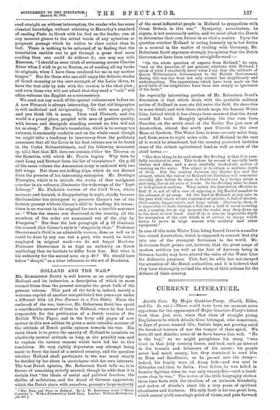HOLLAND AND THE WAR.*
MR. ROBERTSON SCOTT is well known as an authority upon Holland and its industries, a description of which in more normal times than the present occupies the great bulk of the present volume. This part of the book is, indeed, merely a welcome reprint of another one published two years ago under a different title (A Free Farmer is is Free Stale). Since the outbreak of the war, however, Mr. Robertson Scott has spent a considerable amount of time in Holland, where he has been responsible for the publication of a Dutch version of the British White Paper, and in the forty odd pages of new matter in this new edition he gives a most valuable account of the attitude of Dutch public opinion towards the war. His main thesis is to prove the anxiety of Holland to maintain an absolutely neutral attitude as long as she possibly can, and to explain the various reasons which have led her to this resolution. He very rightly deprecates any attempt being made to force the hand of a neutral country, and the question whether Holland shall participate in the war must clearly be decided by her alone in accordance with her own interests. The best Dutch opinion, Mr. Robertson Scott tells us, is in favour of remaining strictly neutral, though he adds that it is certain that " the ideals of social and political freedom, the dislike of militarism, and the dread of German aggression, which the Dutch share with ourselves, prompts large majority
- • Mar Time and Peoe, in Rolland. By J. W. Robertson Scott C. Home Cousitiee"). With a Foreword by Lord limy, Loudon: William Heinemann. [Oa net.]
of the most influential people in Holland to sympathise with Great Britain in this war." Sympathy, nevertheless, he argues, is not necessarily active, and we must allow the Dutch to determine their own future in so vital a matter. Upon the question whether Holland ie acting honestly up to her duties as a neutral in the matter of trading with Germany, Mr. Robertson Scott expresses strongly his opinion that the Dutch Government have been entirely straightforward :—
"On the whole question of exports from Holland," he says, "and on the question of our general relations with Holland, I speak of what 1 absolutely know when I say that the attitude of Queen Wilhelmina's Government to the British Government during this war has been not only correct but neighbourly and understanding. The imputations which have been made on the good faith of our neighbours have been due simply to ignorance of the facts."
An especially interesting portion of Mr. Robertson Scott's discussion is that which deals with the probable military action of Holland in case she did enter the field. He describes in some detail, and with three sketch maps, the famous Water Line, behind which it has always been assumed that the Army would fall back. Roughly speaking, the lino runs from Reardon, on the south coast of the Zuider Zee just east of Amsterdam, almost due south past Utrecht to the river Maas at Gorkum. The Water Line is some seventy miles long, and from seven to eight miles wide. All Holland to the east of it would be abandoned, but the country protected includes some of the richest agricultural laud as well as most of the chief towns :—
" The first thing to be said about the flooding is that it is care- fully restricted in area. This is done by means of specially built sluices and dikes, and a most carefully worked-out system of running on the water. The object is to obtain a uniform depth of 18 in. But the country between the Zuider Zee and the estuary, which the visitor to Holland old noshing will remember crossing just before he earns to Dordrecht by a bridge about a mile long, lies at all sorts of levels. So the flooding most be done in well-planned sections. What makes the inundation effective is that it is not at all a ease of opposing a big flooded meadow to the advance of an army. All the land in Holland, at any mto in the part with which we are concerned at present, is full of ditches, little meals, bigger canals, and large canals. Obviously, then, it is impossible to wade through a foot and a half of water covering such a country, for at any moment the wader may drop down up to the neck or over head. And 18 in. is also an impossible depth for navigation of the sort which is of service to troops which desire to move in huge masses with artillery and other equipment."
In case of this main Water Lino being forced there is smaller line round Amsterdam, which is supposed to convert that city into one of the strongest fortresses in the world. Mr. Robertson Scott points oat, however, that the great range of modern artillery (as well as the fact of Antwerp being in German hands) may have altered the value of the Water Line for defensive purposes. This fact, he adds, has not escaped the attention of the Dutch authorities, and it ie believed that they have thoroughly revised the whole of their scheme for the defence of their country.


















































 Previous page
Previous page